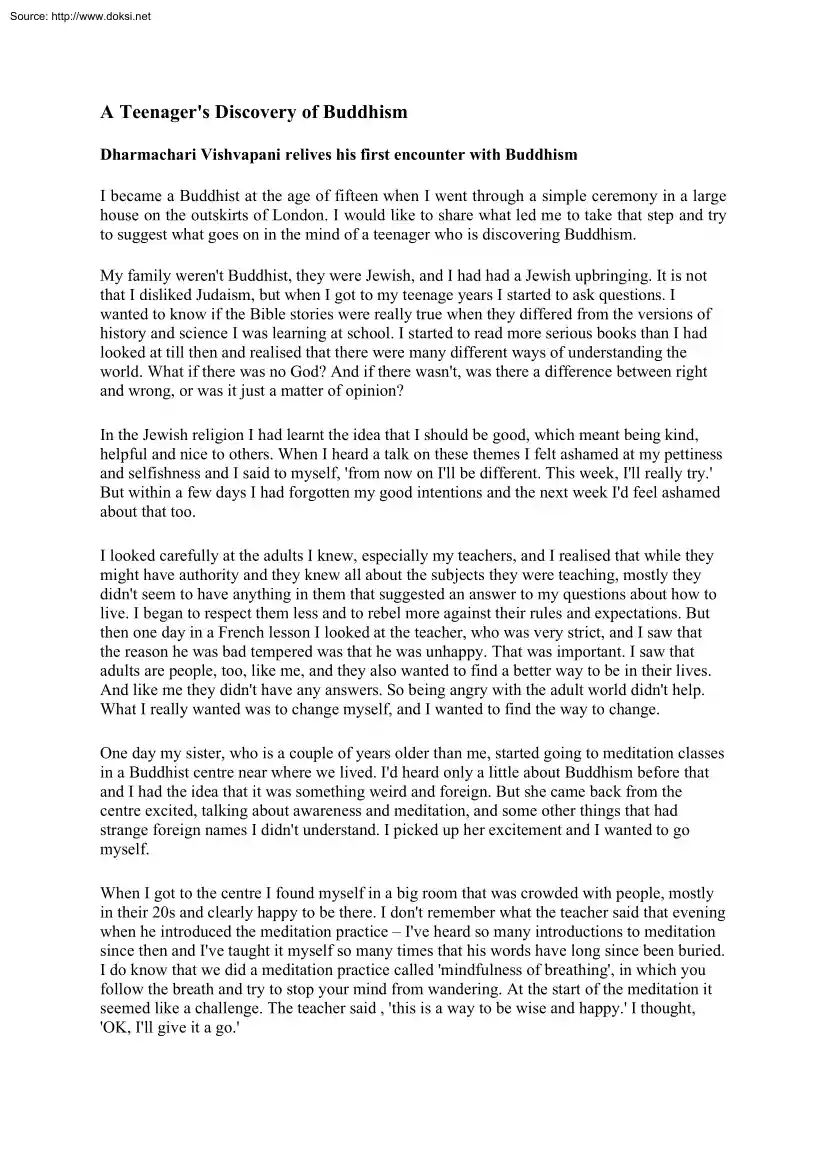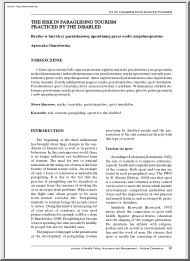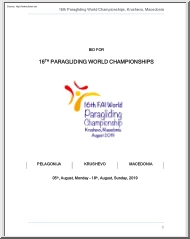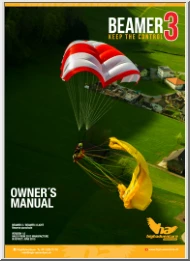Please log in to read this in our online viewer!

Please log in to read this in our online viewer!
No comments yet. You can be the first!
What did others read after this?
Content extract
Source: http://www.doksinet A Teenager's Discovery of Buddhism Dharmachari Vishvapani relives his first encounter with Buddhism I became a Buddhist at the age of fifteen when I went through a simple ceremony in a large house on the outskirts of London. I would like to share what led me to take that step and try to suggest what goes on in the mind of a teenager who is discovering Buddhism. My family weren't Buddhist, they were Jewish, and I had had a Jewish upbringing. It is not that I disliked Judaism, but when I got to my teenage years I started to ask questions. I wanted to know if the Bible stories were really true when they differed from the versions of history and science I was learning at school. I started to read more serious books than I had looked at till then and realised that there were many different ways of understanding the world. What if there was no God? And if there wasn't, was there a difference between right and wrong, or was it just a matter of
opinion? In the Jewish religion I had learnt the idea that I should be good, which meant being kind, helpful and nice to others. When I heard a talk on these themes I felt ashamed at my pettiness and selfishness and I said to myself, 'from now on I'll be different. This week, I'll really try' But within a few days I had forgotten my good intentions and the next week I'd feel ashamed about that too. I looked carefully at the adults I knew, especially my teachers, and I realised that while they might have authority and they knew all about the subjects they were teaching, mostly they didn't seem to have anything in them that suggested an answer to my questions about how to live. I began to respect them less and to rebel more against their rules and expectations But then one day in a French lesson I looked at the teacher, who was very strict, and I saw that the reason he was bad tempered was that he was unhappy. That was important I saw that adults are people,
too, like me, and they also wanted to find a better way to be in their lives. And like me they didn't have any answers. So being angry with the adult world didn't help What I really wanted was to change myself, and I wanted to find the way to change. One day my sister, who is a couple of years older than me, started going to meditation classes in a Buddhist centre near where we lived. I'd heard only a little about Buddhism before that and I had the idea that it was something weird and foreign. But she came back from the centre excited, talking about awareness and meditation, and some other things that had strange foreign names I didn't understand. I picked up her excitement and I wanted to go myself. When I got to the centre I found myself in a big room that was crowded with people, mostly in their 20s and clearly happy to be there. I don't remember what the teacher said that evening when he introduced the meditation practice – I've heard so many
introductions to meditation since then and I've taught it myself so many times that his words have long since been buried. I do know that we did a meditation practice called 'mindfulness of breathing', in which you follow the breath and try to stop your mind from wandering. At the start of the meditation it seemed like a challenge. The teacher said , 'this is a way to be wise and happy' I thought, 'OK, I'll give it a go.' Source: http://www.doksinet So we started. I breathed in, I breathed out and I counted, 'one', just as the teacher had said I breathed in, breathed out and counted 'two'. This was easy, and I was sure I could quickly get really good at this. I imagined myself glowing with calm and peace I'd exert a magical attraction, everyone would admire me, and I'd be fascinating to girls. I would But then I realised that I had breathed a few more times and not counted or even noticed that I was breathing.
What number was I on? Perhaps this wasn't so simple after all I went back to the start 'Breathe in, breathe out, count “one, one”'. After I had been sitting cross-legged for ten minutes my leg started to go to sleep. I sensed the numbness spreading upwards from my toes and I wondered if I should move. Was I allowed to? How would I get up at the end of the meditation? I'd hobble out of the room with everyone looking at me. After fifteen minutes my leg began to hurt and after twenty the pain was excruciating. I must be doing something wrong, I thought I couldn't stand it, I would have to move. Not long to go now But then I thought about the meditation It had slipped away and my thoughts had travelled miles from the breathing. I made one last effort before the bell finally rang to end the session. Even though that first meditation was full of distraction and struggle, when it was over I found that I felt calm and centred. And growing out of that calm I felt a
new kind of strength swelling up within me. I was determined to get to grips with the concentration But most of all I knew that, in spite of my difficulties in the meditation, something important had happened. I couldn't have said at the time what that was, but with hindsight I think I know now how to express the new perspective that the meditation had opened up. For one thing I had seen myself and my experience in a new way. The meditation had been a struggle because thoughts came in, I got interested in them and I easily forgot what I was trying to do. But actually that sort of thing was happening all the time. The meditation was very simple – just paying attention to my breath and trying not to allow my attention to wander – but it wasn't so easy to do and its simplicity meant I saw why not. I noticed how my thoughts raced around and I realised that they were whirling round like that the rest of the time as well. It's just that I didn't notice when I was busy
doing other things. This was very interesting. I hadn't really considered a simple fact about my experience – that I had a mind that worked in ways that weren't under my control. It was as if my thoughts and feelings weren't really mine. I went from mood to mood, from one pre-occupation to another, without noticing what was happening. But where did all those thoughts come from and what effect did they have on me? In the months that followed that class I kept attending the centre. I began to learn what Buddhism taught about the life and I joined in discussions about how to put those teachings into practice. As I got to know some of the Buddhists I found that all of them were calm and friendly, but with a few there was something else as well. They seemed big – bigger than the size of their actual bodies, as if a larger presence filled them out. Talking to them I sometimes had a strange feeling that these people opened out backwards and if I could enter their experience
I would find myself in a much larger space than I was used to occupying. They had about them a touch of something mysterious, even dangerous. Source: http://www.doksinet I continued to meditate, and - though it was never easy - at moments, particularly when I attended my first weekend retreats, a new dimension would open up. I saw that it would take a long time to progress with meditation or really to understand the rest of Buddhism, let alone to transform my consciousness. But that didn't matter I was on my way And so it was that a year later I went through the ceremony to become a mitra, which is the Sanskrit word for 'friend, and through that ceremony I became a Buddhist within the particular movement that ran the activities at this centre. It was called the Friends of the Western Buddhist Order. I offered a flower, which symbolised the beauty and impermanence of things; a candle, which symbolised the light of the truth; and a stick of incense, which spreads through the
air like the pervasive effect of living a spiritual life. I offered these to the Buddha and in this way I became a Buddhist. I have told the story of my own discovery of Buddhism because it shows that you don't have to be a certain age to start to appreciate it. Questioning and seeking a higher purpose is part of human life that is felt especially strongly by young people. For those brought up to be Buddhists, whether in Asia or the West, Buddhism can seem to belong to the old world, not the new world that has grown up in western countries and is spreading across Asia. The world of computers and television, travel and technology It can seem just a matter of going to the temple and making offerings, something for old people and monks. But I found that Buddhism could make a real difference to my life as a young person in London in the 20th century. It was just as relevant there as it had ever been in Asian countries in the past. On the first night I had learnt meditation, an image
filled my thoughts, the image I had seen when the leader had told us to open our eyes at the end of the session. It was of the golden Buddha statue at the end of the room, the same Buddha to whom I later made my offerings. The Buddha's eyes were cast downwards and his lips were turned by a gentle half-smile. But it was the strangest thing. He seemed to be looking straight at me and that smile was for my benefit, mine alone. It was the Buddha's way of saying that he understood completely what had gone on in my mind, and that he saw right into the depths of me. In fact it meant that he understood more than I could even imagine. And his smile said that he saw not only what I was, but what I would become. That put my questions into a new light. Not, what am I like? Not, how can I be different? Not, how can I be good? But, what can I become?
opinion? In the Jewish religion I had learnt the idea that I should be good, which meant being kind, helpful and nice to others. When I heard a talk on these themes I felt ashamed at my pettiness and selfishness and I said to myself, 'from now on I'll be different. This week, I'll really try' But within a few days I had forgotten my good intentions and the next week I'd feel ashamed about that too. I looked carefully at the adults I knew, especially my teachers, and I realised that while they might have authority and they knew all about the subjects they were teaching, mostly they didn't seem to have anything in them that suggested an answer to my questions about how to live. I began to respect them less and to rebel more against their rules and expectations But then one day in a French lesson I looked at the teacher, who was very strict, and I saw that the reason he was bad tempered was that he was unhappy. That was important I saw that adults are people,
too, like me, and they also wanted to find a better way to be in their lives. And like me they didn't have any answers. So being angry with the adult world didn't help What I really wanted was to change myself, and I wanted to find the way to change. One day my sister, who is a couple of years older than me, started going to meditation classes in a Buddhist centre near where we lived. I'd heard only a little about Buddhism before that and I had the idea that it was something weird and foreign. But she came back from the centre excited, talking about awareness and meditation, and some other things that had strange foreign names I didn't understand. I picked up her excitement and I wanted to go myself. When I got to the centre I found myself in a big room that was crowded with people, mostly in their 20s and clearly happy to be there. I don't remember what the teacher said that evening when he introduced the meditation practice – I've heard so many
introductions to meditation since then and I've taught it myself so many times that his words have long since been buried. I do know that we did a meditation practice called 'mindfulness of breathing', in which you follow the breath and try to stop your mind from wandering. At the start of the meditation it seemed like a challenge. The teacher said , 'this is a way to be wise and happy' I thought, 'OK, I'll give it a go.' Source: http://www.doksinet So we started. I breathed in, I breathed out and I counted, 'one', just as the teacher had said I breathed in, breathed out and counted 'two'. This was easy, and I was sure I could quickly get really good at this. I imagined myself glowing with calm and peace I'd exert a magical attraction, everyone would admire me, and I'd be fascinating to girls. I would But then I realised that I had breathed a few more times and not counted or even noticed that I was breathing.
What number was I on? Perhaps this wasn't so simple after all I went back to the start 'Breathe in, breathe out, count “one, one”'. After I had been sitting cross-legged for ten minutes my leg started to go to sleep. I sensed the numbness spreading upwards from my toes and I wondered if I should move. Was I allowed to? How would I get up at the end of the meditation? I'd hobble out of the room with everyone looking at me. After fifteen minutes my leg began to hurt and after twenty the pain was excruciating. I must be doing something wrong, I thought I couldn't stand it, I would have to move. Not long to go now But then I thought about the meditation It had slipped away and my thoughts had travelled miles from the breathing. I made one last effort before the bell finally rang to end the session. Even though that first meditation was full of distraction and struggle, when it was over I found that I felt calm and centred. And growing out of that calm I felt a
new kind of strength swelling up within me. I was determined to get to grips with the concentration But most of all I knew that, in spite of my difficulties in the meditation, something important had happened. I couldn't have said at the time what that was, but with hindsight I think I know now how to express the new perspective that the meditation had opened up. For one thing I had seen myself and my experience in a new way. The meditation had been a struggle because thoughts came in, I got interested in them and I easily forgot what I was trying to do. But actually that sort of thing was happening all the time. The meditation was very simple – just paying attention to my breath and trying not to allow my attention to wander – but it wasn't so easy to do and its simplicity meant I saw why not. I noticed how my thoughts raced around and I realised that they were whirling round like that the rest of the time as well. It's just that I didn't notice when I was busy
doing other things. This was very interesting. I hadn't really considered a simple fact about my experience – that I had a mind that worked in ways that weren't under my control. It was as if my thoughts and feelings weren't really mine. I went from mood to mood, from one pre-occupation to another, without noticing what was happening. But where did all those thoughts come from and what effect did they have on me? In the months that followed that class I kept attending the centre. I began to learn what Buddhism taught about the life and I joined in discussions about how to put those teachings into practice. As I got to know some of the Buddhists I found that all of them were calm and friendly, but with a few there was something else as well. They seemed big – bigger than the size of their actual bodies, as if a larger presence filled them out. Talking to them I sometimes had a strange feeling that these people opened out backwards and if I could enter their experience
I would find myself in a much larger space than I was used to occupying. They had about them a touch of something mysterious, even dangerous. Source: http://www.doksinet I continued to meditate, and - though it was never easy - at moments, particularly when I attended my first weekend retreats, a new dimension would open up. I saw that it would take a long time to progress with meditation or really to understand the rest of Buddhism, let alone to transform my consciousness. But that didn't matter I was on my way And so it was that a year later I went through the ceremony to become a mitra, which is the Sanskrit word for 'friend, and through that ceremony I became a Buddhist within the particular movement that ran the activities at this centre. It was called the Friends of the Western Buddhist Order. I offered a flower, which symbolised the beauty and impermanence of things; a candle, which symbolised the light of the truth; and a stick of incense, which spreads through the
air like the pervasive effect of living a spiritual life. I offered these to the Buddha and in this way I became a Buddhist. I have told the story of my own discovery of Buddhism because it shows that you don't have to be a certain age to start to appreciate it. Questioning and seeking a higher purpose is part of human life that is felt especially strongly by young people. For those brought up to be Buddhists, whether in Asia or the West, Buddhism can seem to belong to the old world, not the new world that has grown up in western countries and is spreading across Asia. The world of computers and television, travel and technology It can seem just a matter of going to the temple and making offerings, something for old people and monks. But I found that Buddhism could make a real difference to my life as a young person in London in the 20th century. It was just as relevant there as it had ever been in Asian countries in the past. On the first night I had learnt meditation, an image
filled my thoughts, the image I had seen when the leader had told us to open our eyes at the end of the session. It was of the golden Buddha statue at the end of the room, the same Buddha to whom I later made my offerings. The Buddha's eyes were cast downwards and his lips were turned by a gentle half-smile. But it was the strangest thing. He seemed to be looking straight at me and that smile was for my benefit, mine alone. It was the Buddha's way of saying that he understood completely what had gone on in my mind, and that he saw right into the depths of me. In fact it meant that he understood more than I could even imagine. And his smile said that he saw not only what I was, but what I would become. That put my questions into a new light. Not, what am I like? Not, how can I be different? Not, how can I be good? But, what can I become?




 When reading, most of us just let a story wash over us, getting lost in the world of the book rather than paying attention to the individual elements of the plot or writing. However, in English class, our teachers ask us to look at the mechanics of the writing.
When reading, most of us just let a story wash over us, getting lost in the world of the book rather than paying attention to the individual elements of the plot or writing. However, in English class, our teachers ask us to look at the mechanics of the writing.